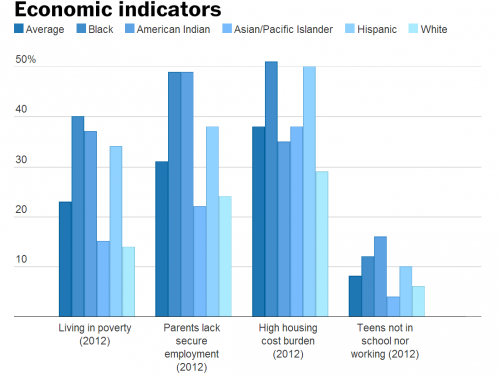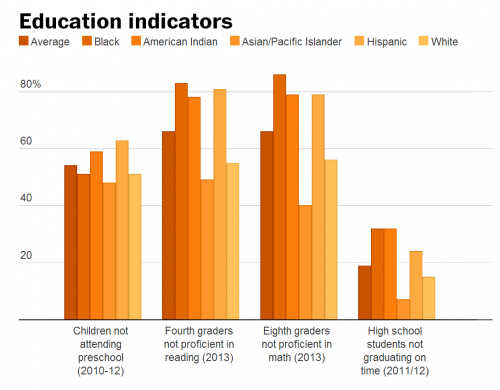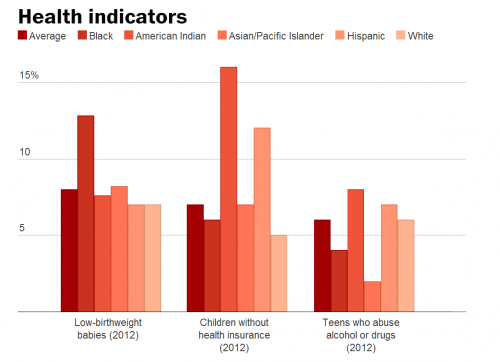If the well-being of our children is an indicator of the health of our society we definitely should be concerned. Almost one-fourth of all children in the U.S. live in poverty.
The Annie E. Casey Foundation publishes an annual data book on the status of American children. Here are a few key quotes from 2014 (all data refer to children 18 and under, unless otherwise specified):
- Nationally, 23 percent of children (16.4 million) lived in poor families in 2012, up from 19 percent in 2005 (13.4 million), representing an increase of 3 million more children in poverty.
- In 2012, three in 10 children (23.1 million) lived in families where no parent had full-time, year-round employment. Since 2008, the number of such children climbed by 2.9 million.
- Across the nation, 38 percent of children (27.8 million) lived in households with a high housing cost burden in 2012, compared with 37 percent in 2005 (27.4 million).
As alarming as these statistics are, they hide the terrible and continuing weight of racism. Emily Badger, writing in the Washington Post, produced the following charts based on tables from the data book.
Children live in poverty because they live in families in poverty. Sadly, despite the fact that we have been in a so-called economic expansion since 2009, most working people continue to struggle. The Los Angeles Times reported that “four out of 10 American households were straining financially five years after the Great Recession — many struggling with tight credit, education debt and retirement issues, according to a new Federal Reserve survey of consumers.”
Martin Hart-Landsberg is a professor of economics at Lewis and Clark College. You can follow him at Reports from the Economic Front.



Comments 6
Bill R — August 23, 2014
In the late 1950s, the poverty rate for all Americans was 22.4 percent. In dropped to the 12-13% level in the 70s and then rose again in the 80s to ~15% which is roughly where it is today. America is richer than most other countries and has seen a big drop in poverty over time.
The poverty rate for children has always been higher than the overall poverty rate. Virtually by definition they live with young wage earners who don't make as much as the rest of the working population; not a news flash. Also not surprising: The poverty rate for people in households headed by single women is significantly higher than the overall poverty rate.
Financial recessions are killers and the recoveries are painstakingly slow. There is no pill to take. This too shall pass, although the time is painful for those suffering now.
Lalo — August 23, 2014
Interesting.
I grew up in what is one of the poorest areas in America. I never really realized I was growing up in what is deemed poverty until after I turned 18 years. I assumed I was middle class, and didn't realized that I was categorized as living in poverty my whole life. Was raised by a single mother, with two brothers, and our annual income was somewhere around $10,000. I knew other kids that struggled far more than me, and they lived in colonias near the border, so I thought of them as living in poverty.
Jeff — August 25, 2014
Although American poverty rates have fluctuated over decades and it is considerably better off than plenty of other countries, this is really no excuse for the current state of poverty in our country. At present day, we also possess far more superior forms of technology than the past. Technology that could be used to benefit not just the few but all in our society. What our problem here is not our ability but our profit mentality. If poverty is ever to be eradicated we are going to need a shift in society towards a more compassionate direction. This doesn't even take into account our growing population which is another problem altogether. So yes, we may shift back and forth over the decades from a higher or lower percentage of poverty, yet nothing will ever stabilize until we address the source.
Music Monday: Life Finds a Way? – Bridget Magnus and the World as Seen from 4'11" — August 25, 2014
[…] In Closing: hopefully a few last words on Ferguson, the militarization of our police, the death of the right to peaceably assemble, and the press (but it won’t be the last because of race); a “difficult decision“; hey now, don’t get too skinny!; don’t think I’ve forgotten about the NSA; and children in poverty. […]
Meyer — July 1, 2025
Nice post https://slice-masters.io